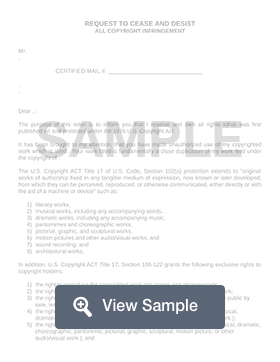Cease and Desist Copyright Infringement Letter Form
A cease and desist copyright infringement letter is a document used to inform someone in writing that they are required to stop using material that is copyrighted to another person. Usually, the person holding the copyright (or their agent or legal representative) sends the letter to the offending party and demands that they stop using the material by a certain date and what will happen if they fail to comply. The letter should be sent through certified mail with a return receipt requested.
What is a cease and desist copyright infringement letter?
Copyright law provides protection to original work with a creative element, including literary, dramatic, musical, and artistic creations. In order to stop a person from continuing an act of copyright infringement, someone may send a copyright infringement cease and desist letter. This letter will detail the acts of copyright infringement and ask the party to stop these actions by a certain date. A letter asking someone to cease and desist can be considered a last warning for someone to stop their infringing actions before pursuing legal remedies.
In order to help demonstrate proof of the copyright infringement occurring, you can attach documents or records to the letter that is being sent. Be sure that you send only copies, as you will want to keep originals. You will also want to ensure you keep a copy of the letter being sent.
Since a cease or desist request can lead to legal actions, it can be beneficial to get legal counsel relating to the matter. Have a lawyer look over your letter and sign it as well to protect yourself and your legal rights.
Other Names
- Cease and desist letter copyright infringement
- Copyright cease and desist
- Demand letter
- Violation letter
- Takedown letter

Create a Cease and Desist Copyright Infringement Letter in minutes with our professional document builder.
When do I need one?
You need this letter when an individual or business is violating your copyright rights.
Cease and desist letters are also commonly used: to stop harassment, to stop a trademark infringement, to stop debt collectors, to stop defamation.
You can draft your own letter using cease and desist letter templates that are available online, or you can work with a law firm that specializes in U.S. Copyright laws. A lawyer will be helpful if you do not receive a favorable response re: cease and desist and can advise you of the appropriate legal action.
Consequences of Not Using One
If you do not use a cease and desist letter, the unlawful behavior will continue. When you send a cease and desist letter, you are letting the infringer know of their infringing behavior and putting them on notice of your claims. This prevents them from later claiming a lack of knowledge that they are infringing upon the copyrighted work.
If you fail to send a cease and desist letter, you may suffer lost opportunity costs and loss of money. Customers may be confused about who is the original creator of the copyrighted material and may mistakenly purchase the wrong product.
Components of a copyright infringement letter
The typical copyright infringement letter will include the following basic elements:
- Sender
- Recipient
- Description of the copyrighted intellectual property and proof you are the copyright owner
- Detailed description of the infringing activity and its negative consequences
- Warning that you will pursue legal action if the behavior does not stop
- Deadline for when the offending behavior must stop
You should send your copyright cease and desist letter certified mail, return receipt requested.
Legal Considerations
There are no laws that dictate exactly what must go into a cease and desist letter. Typically, you should include a detailed description of the offending conduct and a clear demand to stop.
If you end up in court, your cease and desist copyright infringement letter may be used to show that the defendant was put on notice about their offending behavior.
In the United States, The Copyright Act of 1976 (17 U.S.C. §§ 101-810) and the Digital Millennium Copyright Act (17 U.S.C. Section 512, 1201–1205, 1301–1332; 28 U.S.C. § 4001) may apply to this letter.
